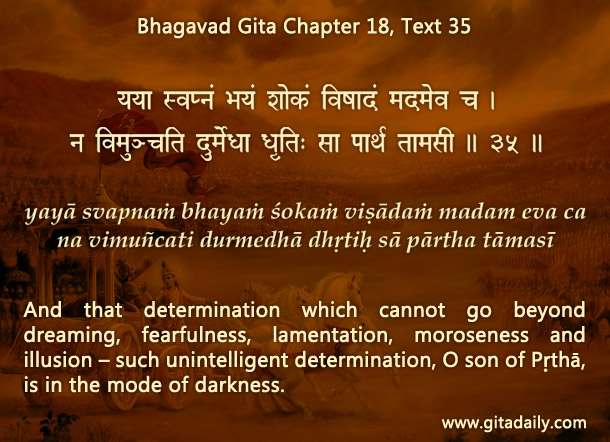Suppose we are lost in a dangerous forest, trying in vain to find a way back to safety. Suppose further we find a way that is filled with warning signs saying, “Danger ahead; do not proceed.” Deterred by those signs, we will not go that way. If, however, we have exhausted all other possibilities to get out of the forest, then finally, we will neglect those warnings and continue along that way till we get out of the forest.
Our situation is similar when we are caught in a state of fear. We are lost in the inner territory of our fear-filled consciousness, which is like a forest from which we can’t find any way out — no matter what we do, we don’t seem to get free from our fear. While we are thus lost, we rarely consider one course of action: confronting the source of our fear. Why not? Because it triggers even greater fear within us; in the forest metaphor, it is like the warning-filled path. Pertinently, the Bhagavad-gita (18.35) points to this peculiar pathological nature of chronic fearfulness by terming it as a perverse determination in the mode of ignorance — we hold on to the thought-patterns than keep us in fear. .
Yet facing the source of our fear is the path to freedom. Let’s understand how. When we expose ourselves to the stimulus that causes us fear, we often get to see for ourselves that nothing disastrous happens, that the doomsday prophecies of fear were unfounded, that the link between the source of fear and the occurrence of disaster was just a mental construct. It is this experience that is our doorway to freedom from fear.
Unfortunately however, we don’t choose to confront the source of our fear till we have exhausted all other options. But we don’t have to let such confrontation be our last choice. To choose it much earlier, we need to identify what is actually fear’s sinister strategy: to prevent us from doing the very thing that will remove our fear. Once we identify its modus operandi, we no longer wait for fear to go away; we push ourselves to go on the way that fear doesn’t want us to go. And that willingness to push ourselves is the essence of courage.
The courage to face our fears has to ultimately come from our own intention. Yet that intention can be strengthened and sustained by the spiritual insight that we are at our core indestructible beings. We can never be hurt by any material danger — why, then, should we let fear deter us from confronting its source?
Summary:
Courage comes when we realize that fear will go away only when we go on the way that fear doesn’t want us to go.
Think it over:
- How does fear keep us trapped in its grip?
- What is the way to get fear to go away?
- Have you ever experienced fear going away when you confronted it?
***
18.35: And that determination which cannot go beyond dreaming, fearfulness, lamentation, moroseness and illusion – such unintelligent determination, O son of Prutha, is in the mode of darkness.
Audio explanation of the article is here:

To know more about this verse, please click on the image

Leave A Comment